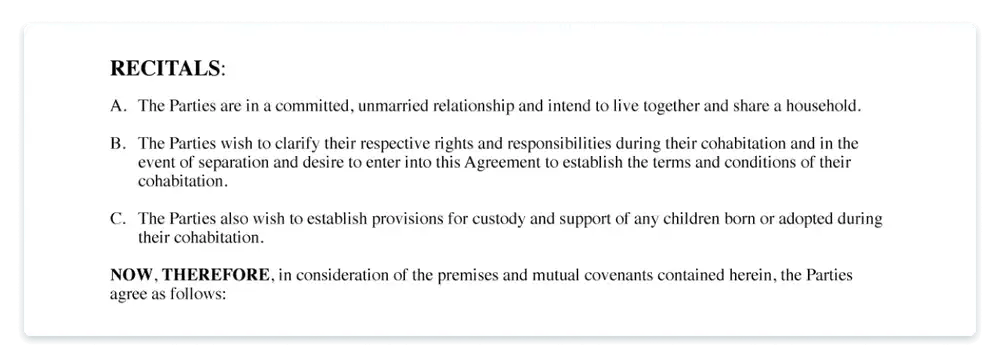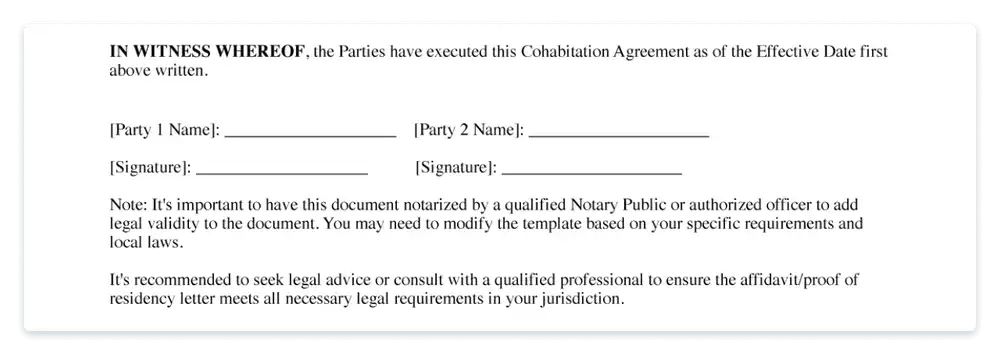
If you are planning to move in with your special other, a Cohabitation Agreement can be used to set the terms of the relationship.
Templates created by legal professionals
Customize your documents quickly & easily
24/7 free phone & email customer support
Trusted by 2,547 users.
Are you living with your partner? Are you living with your partner?Last Update August 29th, 2024
Fill forms in a few steps
Save, print, & download
Done in 5 minutes
Table of Contents:A Cohabitation Agreement serves as a legally binding document between 2 individuals choosing to share a life as unwed partners.
Unlike marriage where legal entitlements to property division and spousal support are automatically provided, couples living together lack these privileges in the absence of a formalized agreement.
A Cohabitation Agreement is purposefully crafted to cater to the needs of romantically involved couples who intend to share a home.
This type of legal form enables non-married couples to clearly articulate their agreed-upon management of property and finances both throughout their relationship and in the event of a separation.
Assuming your Cohabitation Agreement satisfies your state's legal requirements, you can seek the court's assistance in compelling your former partner to honor their contractual obligations, should they choose not to comply.
Other common names used for this type of agreement are:
While the specific legal requirements for a Cohabitation Agreement can vary depending on the jurisdiction, several general principles tend to apply universally.
Cohabitation Agreements are still not legally recognized in some states. Courts in Georgia (Ga. Code § 13-8-1 (2023) and Louisiana may deem them invalid due to moral judgments, while Illinois allows limited enforcement if unrelated to a marriage-like relationship.
Crafting a Cohabitation Agreement offers couples the flexibility to tailor its scope to their specific needs, whether it encompasses the entirety of their relationship or focuses on specific transactions, such as purchasing a property.
The agreement should explicitly outline their preferences regarding property and financial sharing and should include the sections listed below.
This section should state that both parties have consented to reside together in a committed relationship, sharing a common household at the specified residence throughout their cohabitation.
In this part of the form, it is defined how both parties will divide and contribute to shared expenses, such as rent/mortgage, utilities, groceries, and other household-related costs in an equitable manner.
It is important to note that despite sharing expenses, the parties often maintain separate bank accounts.
In the event the parties choose to separate, this section establishes a mutually agreed process for handling the distribution of assets, debts, and property acquired during the cohabitation period.
The parties are committed to ensuring a fair and equitable division and are dedicated to resolving any disagreements through peaceful negotiation or mediation, avoiding the need for litigation.
If the parties have a child together during their cohabitation, they are dedicated to jointly making decisions regarding custody, visitation, and support.
Their decisions will always prioritize the best interests of the child, and they will comply with relevant laws and court orders governing custody and support arrangements.
The agreement shall cease to be in effect automatically if either party enters into marriage with another person or if both parties mutually consent in writing to terminate it.
Furthermore, the agreement shall be terminated in the event of the death of one of the parties.
This section states that the agreement will be regulated and interpreted based on the laws of the specified state, without considering any conflicting legal provisions.
Through the parties' signatures included in this section, the agreement becomes legally enforceable.
It highlights the significance of the agreement and its applicability to all parties mentioned, ensuring that the terms and obligations stated within it carry legal weight and can be upheld by the appropriate authorities.
Including these issues within a Cohabitation Agreement ensures clarity and transparency, enabling couples to proactively manage their financial and property matters.
Drafting a Cohabitation Agreement allows unmarried couples to establish clear guidelines and address important aspects of their shared life.
Follow the steps below to write an effective Cohabitation Agreement:
Parties and effective date: Identify the parties involved by including their full names, current addresses, and the effective date of the agreement.

Recitals: Describe the committed, unmarried relationship of the parties, their intention to live together, and their desire to establish rights, responsibilities, and provisions for children born or adopted during cohabitation.

Cohabitation: Specify the agreement for living together in a committed relationship and sharing a household at the designated address.

Living costs: List the expenses the parties will share.

Separation: Address the division of assets, debts, and property in case of terminating the relationship.

Custody and support: Establish joint decision-making for custody, visitation, and support arrangements based on the child's best interest.

Termination: Clearly define events that lead to automatic termination.


Compliance: Specify the state whose laws will govern and interpret the agreement.
Validity: State that the agreement is binding upon the parties involved.

Execution: Include a signature block where both parties can sign and date the agreement.

Remember, each cohabitation relationship is unique, so customize the agreement to reflect your specific circumstances.
Use our step-by-step form builder to write your document and avoid critical mistakes that could make it unenforceable.
The rights of unwed couples living together can vary depending on the state or jurisdiction, as there is no uniform federal law governing cohabitation relationships.
However, the following are some general considerations you should take into account when writing your document:
Cohabiting couples generally do not enjoy the same automatic property rights as married couples. Each partner usually retains ownership of the assets they individually acquire unless they explicitly agree otherwise.
While cohabiting couples are generally not subject to the same financial obligations as married couples, such as spousal support or alimony, they do have responsibilities on shared financial matters that they have mutually agreed upon.
Partners who live together often do not have the same rights to each other's healthcare or insurance benefits as married couples. Certain states may acknowledge domestic partnerships or establish alternative legal avenues to grant specific rights and benefits.
In cases where cohabiting couples have children together, both partners may have parental rights and responsibilities. However, these rights can still vary depending on state laws and may require additional legal steps to establish or protect these rights.
Unlike divorce, there is typically no legal framework specifically designed for the dissolution of a cohabitation relationship. Therefore, unwed couples living together need to rely on contractual agreements to address property division, custody, and support matters in case of separation.
To ensure the protection of their interests, unmarried couples living together should be aware that legal rights and obligations differ from those of married couples and the need for well-defined agreements to address these matters effectively.
Completing a Cohabitation Agreement template can prove tricky without a reliable reference point.
Review our Cohabitation Agreement sample below before you begin to make the process of writing your own document more simple.